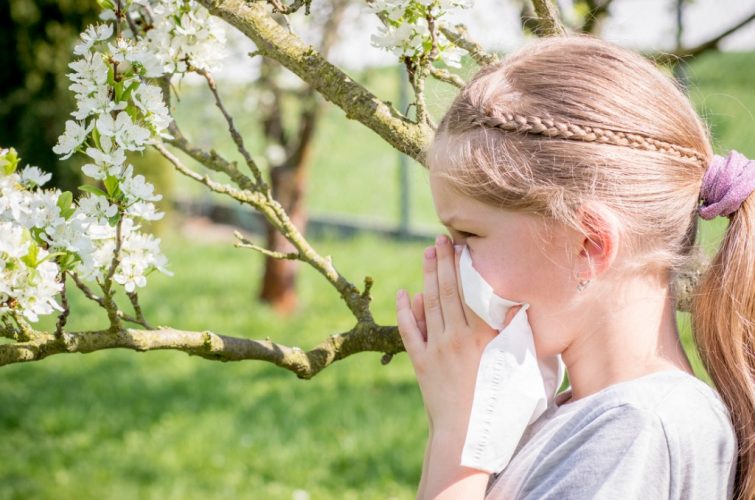
Allergic rhinitis (AR) is caused by the nose and or eyes being exposed to allergens such as pollens, dust mite, mould or animal hair.
It typically causes an itchy or runny nose, blocked nose, sniffing and sneezing. It can also cause itchy or watery eyes which can occur in conjunction with nasal symptoms or in isolation. Symptoms can be year round in the case of dust mite or animal fur, or seasonal (especially spring/summer) with pollens.
Symptoms can be disabling with disruption to sleep, fatigue, headaches and worsening of asthma. It can impact on learning, school and work performance and attendance. 52% of people with persistent allergic rhinitis don’t feel well rested on waking. The significance and severity of AR is often downplayed but it can be very disabling for many people. Thankfully there are many treatment options.
Treatment options vary for allergic rhinitis depending on severity. Mild symptoms can be treated with a non-sedating antihistamine alone – available over-the-counter from pharmacy with different brands offering similar efficacy. They can be safely used by children. If symptoms are more severe, persistent or not responding to antihistamines, then nasal sprays should be considered. These are classed as ‘intranasal corticosteroids’ and aim to prevent flares of rhinitis, not just treat symptoms that you or your child may have today. They work more like an asthma preventer – if you get hay fever in Spring, now is the time to consider starting these for most people. These can be purchased over-the-counter from your pharmacy. In order for them to work best they need to be used correctly – making sure any mucous is cleared by blowing the nose before spraying. Your head should be slightly forward and the nozzle aimed away from the middle of the nose and up towards the eye. You should try avoid sniffing hard during or after spraying so the medication can be in contact longer with the front of the nose where it works best. Sometimes your doctor will add salt water spray or irrigation to help.
Generally, we recommend avoiding decongestant tablets or sprays as they can make things worse long term. There are some newer medications that need a prescription – a combination of a nasal steroid and a nasal antihistamine – they start working within 10 minutes and can provide much better control of symptoms. Talk to your GP about these medications or other options if over-the-counter medications aren’t working for you. Some doctors have historically given ‘allergy injections’ yearly – these are a strong steroid injection that can cause a multitude of serious side effects, especially if given repeatedly, and are not recommended.
Avoiding known allergens can help, although this is often difficult to achieve. Pollen levels are usually highest from late September to November, especially on windy days, in the mornings and after thunderstorms. Canberrapollen.com.au provides grass pollen forecasts for Canberra, which approximately reflect pollen loads in the Central West. It would be fantastic if there was local monitoring! It allows prediction of high or extreme pollen days, to avoid outdoor activity on these days or an increase in medication before heading out. A COVID surgical mask can even help with minimising pollen exposure.
Tips that may help are:
See this handout from ASCIA for more information on minimising allergens.
Generally antihistamines work best before exposure to an allergen, eg before going to grandma’s house with a cat, rather than after arriving at Grandma’s and everyone is already sneezing and itching their eyes. Likewise nasal steroids are better started early in the hay fever season to stop symptoms snowballing. If there is uncertainty about what you are allergic to, it can be useful to have skin prick tests where a small amount of allergen is placed on the skin or blood tests to specific allergens.
Anyone with allergic rhinitis is at risk of thunderstorm asthma and should consider having an asthma reliever. Melbourne in 2016 experienced the world’s largest epidemic thunderstorm event. Thousands of people experienced acute asthma symptoms of wheeze and shortness of breath with some having never previously had symptoms before. Talk to your doctor to see if you are at risk of thunderstorm asthma. We know that controlling AR will help improve asthma control. If you or your child has uncontrolled asthma, it might be worth questioning if they also have AR – 80% of people with asthma do.
For a number of people nose sprays are ineffective in controlling their symptoms, or they don’t like using them. Allergen immunotherapy or desensitisation is where a small amount of the triggering allergen is given either via injection, oral tablet or spray to ‘switch off’ the immune system’s response. Treatment generally lasts three years and can be expensive. But for many people with severe allergic rhinitis, the symptoms are very distressing and the chance to improve symptoms and decrease medication usage it is worth the cost. This treatment can be started in childhood provided they are able to tolerate the treatment.
Like pretty much all things in 2020/21, COVID-19 has complicated things for AR sufferers. It can be difficult to tell allergy symptoms from respiratory symptoms of COVID. For this reason having a COVID test with any new symptoms and beginning of AR symptoms for the year is recommended. If allergy symptoms are persisting it might be useful to have a medical certificate stating you or your child has AR. But it provides even more motivation to get symptoms under control with adequate treatment.
See your GP or pharmacist if you are having trouble with your allergy symptoms.
This article was written by a local GP in the Central West, NSW